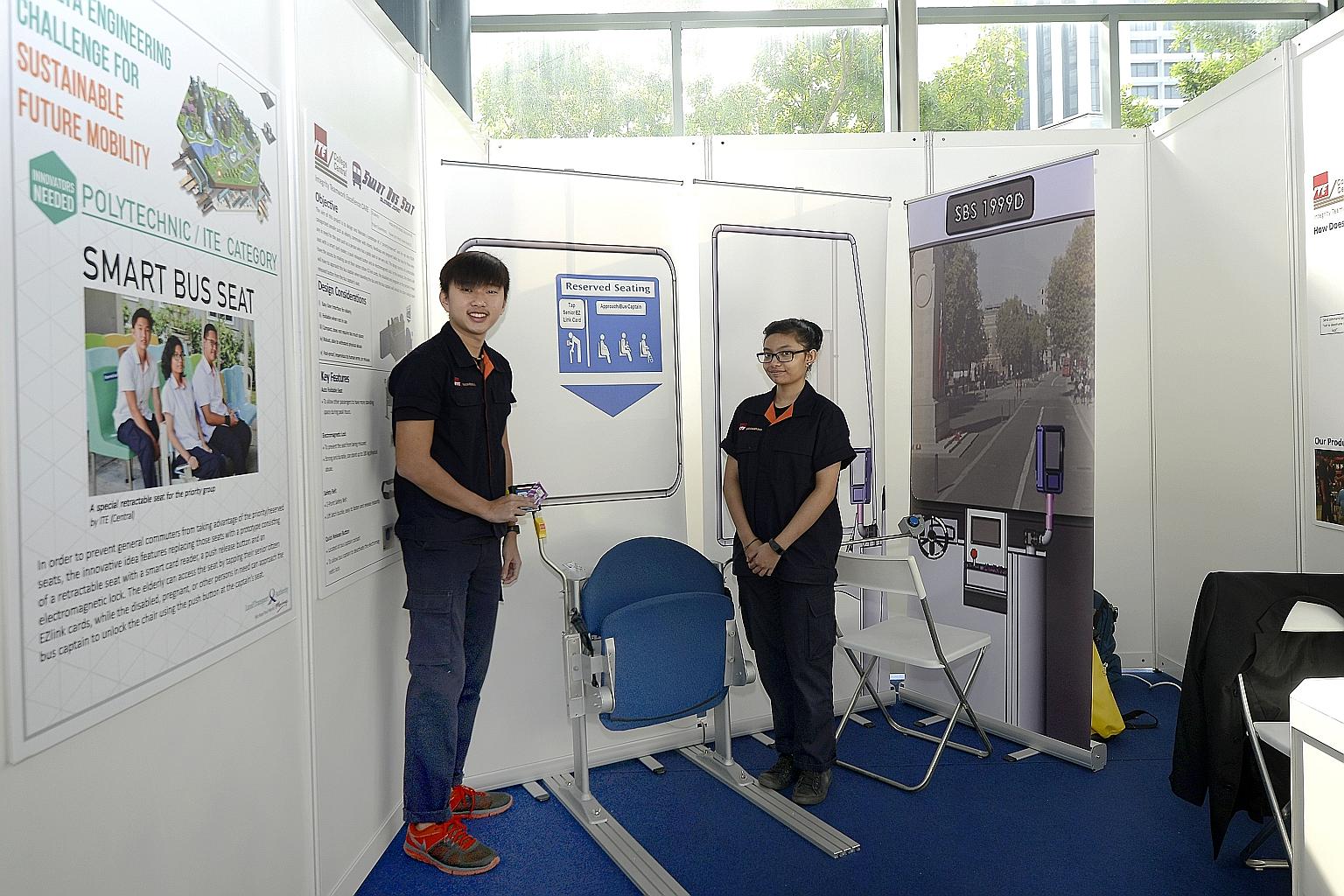Smart seat inspired by daily commute
ITE duo bag silver award in LTA's Engineering Challenge for public bus innovation to aid elderly commuters
Sign up now: Get ST's newsletters delivered to your inbox

Linus Lim and Maizurah Razali with their Smart Bus Seat prototype, which cost $650 to build. Both ITE College Central students are sharing the $5,000 cash prize for the silver award. No one took the gold award.
PHOTO: LAND TRANSPORT AUTHORITY
Follow topic:
Seventeen-year-olds Linus Lim and Maizurah Razali live near each other in Serangoon, and take two buses to get to their school ITE College Central daily, sometimes together.
They would notice older people struggling to find seats, with the priority seats set aside for them often occupied.
So they decided, for a school project, to create what they called the Smart Bus Seat.
The innovation, which cost $650 to build, won Linus and Maizurah the top prize in the Land Transport Authority's Engineering Challenge in the polytechnic and ITE category about two weeks ago.
Unlike existing priority seats, these smart seats fold away so more standing room is available when they are not in use.
When an elderly person flashes his senior citizen's card against a reader located above the chair, the seat is released, and the older person can take the seat. Bus drivers can also release the seats for other passengers who need them by pushing a button from the driver's seat.
Said Linus, who entered his school assignment to have a shot at the prize: "It was so eye-opening because it was my first competition. We had to learn how to weld the chair and magnets, and differentiate the different wires."
Both he and Maizurah are sharing the $5,000 cash prize for the silver award. No one took the gold award.
But he hopes their project might have legs to go further, as it attracted some interest during the exhibition at Suntec City from Oct 19 to 21.
"Hopefully there is a chance this will be on buses one day," he said.
The judging and results, announced at the Singapore International Transport Congress and Exhibition 2016, also placed a pair of brothers from the NUS High School of Mathematics and Science top in the open category.
In the university category, a group of recent graduates from Singapore University of Technology and Design won with their ZaiBike bicycle-sharing plans. Two from the team of nine recent SUTD graduates have started their own company to turn it into reality.
A box controls a lock on the bicycle. When users scan the QR codes on the bike to rent it, signals will be wirelessly sent to release the lock.
Bicycle stands are not needed; as a result, there is less hassle to find or wait for a slot that is free to return the bicycle. Available space is also more effectively utilised. The backend data also allows the company to figure out where the demand for the bikes is, to cater to it.
Said Mr Lee Jun Xiang, 24, one of the two now working full time on their start-up: "We're considering academic campuses and business parks as deployment sites (for our bicycles), and also bikes with 'hill-assist' and e-scooters in the near future too."
The chief judge, Professor Lui Pao Chuen, said the panel looked at factors including each project's feasibility, relevance to Singapore, and level of creativity or innovation. Prof Lui, Singapore's former chief defence scientist, is now retired but still serving as adjunct professor at the National University of Singapore and on several company and school boards.
The inaugural challenge attracted 101 entries in the themes of Sustainable Transport and Future Mobility, including one from brother-sister duo Seng Ian Hao, 12, and Seng Ing Le, 10, the youngest participants.
The two came up with a patent pending Qanemate, a clip that allows walking sticks to be secured to surfaces such as tables or MRT grabpoles, to help the elderly.
Accessories such as near-field communications badges to identify people with dementia can also be attached to the clip.
Though they did not win, the two plan to produce 2,000 of the Qanemates to be given out as Christmas gifts to the elderly.

